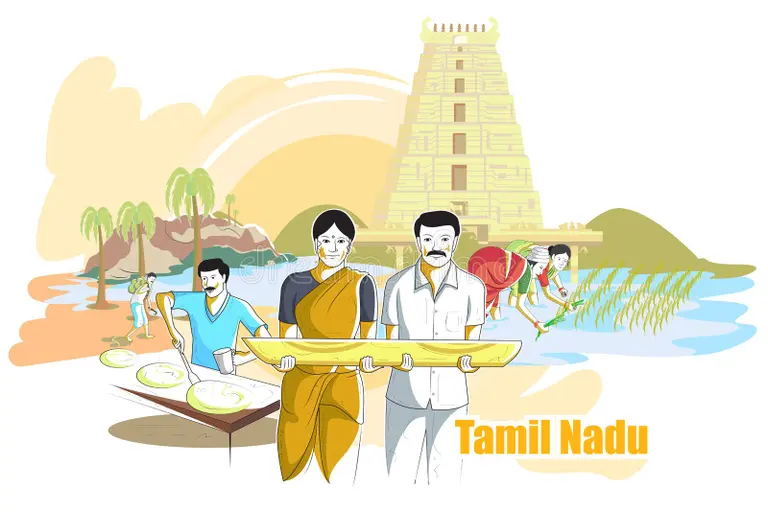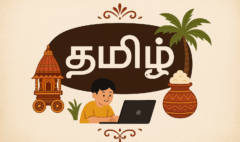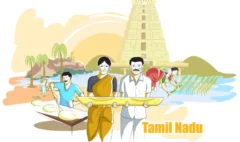How to Talk About Your Past and Future in Tamil
How to Talk About Your Past and Future in Tamil
How to Talk About Your Past and Future in Tamil
In any language, the ability to talk about time is a cornerstone of communication. It allows us to share our experiences, plan for the future, and tell a story with a clear sense of chronology. For anyone on a language journey, mastering the past and future tense in Tamil is a key step in moving from a basic conversationalist to a fluent storyteller. This guide will provide you with all the essential words and phrases you need for talking about time, and it will show you how to build a powerful narrative in Tamil. Get ready to share your life story with clarity and confidence!
At Powerkid Tamil, we believe that language is a tool for connection, and a person’s story is the most powerful way to connect. By mastering these tenses, you are not just learning grammar; you are learning to share your life, your dreams, and your experiences with a new community. Let’s get started on your journey to a more expressive and personal `conversational Tamil`.
The Building Blocks of Time: Past and Future Tense in Tamil
The first step to `talking about time` is to understand the core grammatical rules for conjugating verbs. Tamil, like other languages, has specific rules for how verbs change to reflect when an action took place. While the rules can seem complex at first, they are logical and can be mastered with practice. The key is to understand the root verb and how different suffixes are added to change the tense. Let’s look at a simple verb, “Padi” (to read), as an example.
Past Tense in Tamil
The past tense is used to talk about an action that has already happened. The suffix “th” or “t” is often used to form the past tense. For example:
- நான் படித்தேன் (Naan Padiththean): I read.
- நீ படித்தாய் (Nee Padiththaai): You read.
- அவர் படித்தார் (Avar Padiththaar): He/She read.
- நாம் படித்தோம் (Naam Padiththom): We read.
By understanding this simple rule, you can begin to talk about all the things you did yesterday, last week, or last year. This is the foundation of your narrative in Tamil.
Future Tense in Tamil
The future tense is used to talk about an action that will happen in the future. The suffix “p” or “v” is often used to form the future tense. For example:
- நான் படிப்பேன் (Naan Padippan): I will read.
- நீ படிப்பாய் (Nee Padippaai): You will read.
- அவர் படிப்பார் (Avar Padippaar): He/She will read.
- நாம் படிப்போம் (Naam Padippom): We will read.
By mastering the past and future tense in Tamil, you can move beyond simple, present-tense sentences and into a more complex and expressive style of `conversational Tamil`.
Your Personal Narrative: Talking About Time
Beyond the verbs, there are essential words you need to talk about time and create a clear `narrative in Tamil`. These words are the signposts of a conversation, guiding the listener through your story.
- நேற்று (Nettru): Yesterday
- இன்று (Indru): Today
- நாளை (Naalai): Tomorrow
- முன்னர் (Munnar): Before
- பிறகு (Piragu): After
- கடந்த வாரம் (Kadandha Vaaram): Last week
- அடுத்த வாரம் (Adutha Vaaram): Next week
- கடந்த மாதம் (Kadandha Maadham): Last month
- அடுத்த மாதம் (Adutha Maadham): Next month
From Tense to Story: A Sample Dialogue
Let’s see how these words can be used in a sample dialogue. This conversation shows a person talking about their past and future plans, creating a clear narrative in Tamil.
Person A: “நேற்று நீங்கள் என்ன செய்தீர்கள்?” (Nettru neengal enna seidheergal? – What did you do yesterday?)
Person B: “நான் நேற்று என் நண்பர்களுடன் திரைப்படம் பார்த்தேன்.” (Naan nettru en nanbargaludan thiraippadam paarthean. – I watched a movie with my friends yesterday.)
Person A: “அது நன்றாக இருந்ததா?” (Adhu nandraaga irundhadha? – Was it good?)
Person B: “ஆம், அது மிகவும் நன்றாக இருந்தது. நாளை நீங்கள் என்ன செய்யப் போகிறீர்கள்?” (Aam, adhu migavum nandraaga irundhadhu. Naalai neengal enna seiya pogireergal? – Yes, it was very good. What are you going to do tomorrow?)
Person B: “நாளை நான் ஒரு புதிய இடத்திற்குப் போவேன்.” (Naalai naan oru puthiya idathirkku povean. – I will go to a new place tomorrow.)
This dialogue is a perfect example of how these words can be used to have a meaningful conversation about your life and plans. It is a key part of `conversational Tamil`.
Conclusion
Learning how to talk about your past and future is a significant milestone in your language journey. It is a skill that will empower you to share your life, your dreams, and your experiences with a new community. By mastering the past and future tense in Tamil, you are moving beyond a basic conversationalist and becoming a true storyteller. This is a journey that will enrich your life and your relationships.
At Powerkid Tamil, our expert tutors can help you master the past and future tense in Tamil with a personalized learning plan. We can help you practice your narrative in Tamil in a one-on-one setting, ensuring you are ready for any conversation. Don’t let a language barrier hold you back from sharing your story. Start your lesson today and master the art of talking about time!









